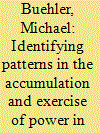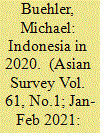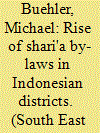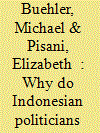| Srl | Item |
| 1 |
ID:
146536


|
|
|
|
|
| Summary/Abstract |
The democratization of politics has been accompanied by a rise of Islamic laws in many Muslim-majority countries. Despite a growing interest in the phenomenon, the Islamization of politics in democratizing Muslim-majority countries is rarely understood as a process that unfolds across space and time. Based on an original dataset established during years of field research in Indonesia, this article analyzes the spread of shari’a regulations across the world’s largest Muslim-majority democracy since 1998. The article shows that shari’a regulations in Indonesia diffused unevenly across space and time. Explanations put forward in the literature on the diffusion of morality policies in other countries such as geographic proximity, institutions, intergovernmental relations and economic conditions did not explain the patterns in the diffusion of shari’a regulations in Indonesia well. Instead, shari’a regulations in Indonesia were most likely to spread across jurisdictions where local Islamist groups situated outside the party system had an established presence. In short, the Islamization of politics was highly contingent on local conditions. Future research will need to pay more attention to local Islamist activists and networks situated outside formal politics as potential causes for the diffusion of shari’a law in democratizing Muslim-majority countries.
|
|
|
|
|
|
|
|
|
|
|
|
|
|
|
|
| 2 |
ID:
110231


|
|
|
|
|
| Publication |
2012.
|
| Summary/Abstract |
The implosion of the New Order in 1998 led to a more democratic political system in Indonesia with elections at all levels of government. A year later, Indonesia also embarked on an ambitious decentralization program that initiated a fundamental restructuring of the country's political institutions on a scale unprecedented since the 1960s. Yet, scholars are still trying to identify clear patterns in the accumulation and exercise of power in this new political environment.
|
|
|
|
|
|
|
|
|
|
|
|
|
|
|
|
| 3 |
ID:
179248


|
|
|
|
|
| Summary/Abstract |
The coronavirus dominated Indonesian politics in 2020. Rather than propelling Indonesia in new directions, however, the pandemic amplified existing political and societal dynamics.
|
|
|
|
|
|
|
|
|
|
|
|
|
|
|
|
| 4 |
ID:
083123


|
|
|
|
|
| Publication |
2008.
|
| Summary/Abstract |
A rising number of districts in Indonesia have adopted shari'a by-laws in recent years. This article shows that this development has to be situated in the context of institutional change. Shari'a by-laws allow regents to open up new revenue streams. These revenues are then used to consolidate political power
|
|
|
|
|
|
|
|
|
|
|
|
|
|
|
|
| 5 |
ID:
151521


|
|
|
|
|
| Summary/Abstract |
Taking the discussion in the existing literature on the adoption of shari’a laws in democratising Muslim-majority countries as a starting point, we posit that there are two broad motivations for democratically-elected politicians to adopt shari’a laws and regulations: ideological conviction on the one hand and response to the expressed or perceived preference of constituents on the other hand. The ‘demand side’ can be further divided into the preferences of individual voters, and the interests of groups which act as power brokers, influencing the voting choices of individual citizens. These groups may be economic, religious, or other actors. These motivations are not mutually exclusive; the passage of a given shari’a regulation may fulfil two or all three of them simultaneously. However, we posit that the interaction between the place, timing, and content of shari’a laws passed in a nation as a whole will vary in various predictable ways, according to the dominant motivations. The dominant motivation may also affect the vigour with which the law is implemented.
|
|
|
|
|
|
|
|
|
|
|
|
|
|
|
|